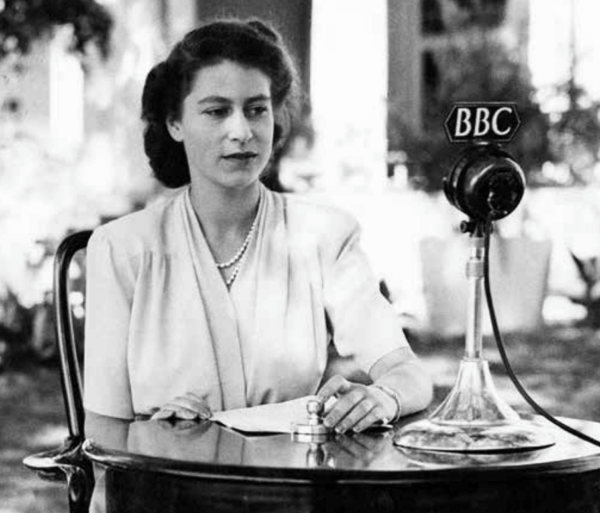The Queen's Speech
Princess Elizabeth’s 21st birthday speech was a landmark statement of devotion broadcast to the world. Olivia Utley recalls how her great-grandfather authored the words that would set the tone for the longest reign in history

By Olivia Utley
April 26 2019
On 21st April 1947, the then Princess Elizabeth made a speech which was to become the cornerstone of her future reign as Queen. As the daughter of a reserved father, the young princess had been kept, by and large, out of the limelight for most of her childhood. Taking to the airwaves on her 21st birthday, while on a tour of Southern Africa, to the country listening she was an unknown quantity. Would this pretty young woman take after her father, the humble and dutiful King George? Or after Edward, his precocious and volatile older brother?
It was quickly clear. Poised and elegant in the dappled light of a Cape Town garden, she famously affirmed: “I declare before you all that my whole life, whether it be long or short, shall be devoted to your service and the service of our great imperial family to which we all belong.”
And she meant it.
You don’t have to be an ardent monarchist to recognise the historic significance of the speech, or the elegance of its words: “If we all go forward together with an unwavering faith, a high courage, and a quiet heart, we shall be able to make of this ancient commonwealth, which we all love so dearly, an even grander thing - more free, more prosperous, more happy and a more powerful influence for good in the world - than it has been in the greatest days of our forefathers.”
Most would agree that “unwavering faith, high courage and quiet heart” have been characteristics she has continued to embody over her 72-year reign.
The words, however, are those of my great-grandfather, Dermot Morrah, who was the author of the speech.

Buried deep in the bowels of a bureau in my mother’s house sits a touching letter, penned by Elizabeth’s Private Secretary, Sir Tommy Lascelles, to Morrah, thanking him.
“I have been reading drafts for many years now. But I cannot recall one that has so completely satisfied me and left me feeling that not one single word should be altered,” wrote Lascelles, known to be a rather crusty, old-fashioned character. “Moreover, dusty cynic that I am, it moved me greatly. It has the trumpeting ring of the other Elizabeth’s Tilbury speech, combined with the immortal simplicity of Queen Victoria’s ‘I will be good’”.
This was high praise indeed for an ageing hack: Morrah, born in 1896, was a leader writer and royal expert for The Times, whose affection for the Monarchy was deep-rooted. Family legend has it in 1901 his nanny found him curled on the hearthrug, face pressed up against the fender, sobbing inconsolably. Alarmed, she asked what on earth had happened, whereupon the four-year-old pointed a shaking finger towards the next room, where his father was telling his mother that Queen Victoria had died.
Later, ahead of the 1953 Coronation, he would be appointed to the ceremonial heraldic title of ‘Arundel Herald Extraordinary’ – this position happened to give him the best seat in Westminster Abbey of any journalist, not to mention the best costume. He loved dressing up in the Heralds’ ceremonial outfits, despite reporting (we have this in a recording still) that the stockings could be “rather itchy”. My grandmother even recalled overhearing a lift attendant at The Times asking, “who is that geezer who comes in here all togged up like a playing card?”
It was during the Second World War that my great-grandfather’s royal speech writing career began. Elizabeth’s father, George VI, was famously afflicted by a stutter, but in the early 1940s his courtiers felt this was sufficiently under control for him to make more complicated speeches. A new speechwriter was therefore needed. The King himself, a devoted Times reader, suggested “a chap on The Times” by the name of Dermot Morrah.
In 1947, the King, the Queen and the two princesses undertook a tour of Southern Africa, and Morrah was sent by the Times to report on it. The King and his heir presumptive realised, rather late in the day, that something ought to be done about her 21st birthday; and it was decided that she would make a broadcast speech to the Commonwealth. But who was to write it? That “chap on the Times” was there. So the task fell to him and, as Lascelles so graciously recognised, he rose magnificently to the occasion. Indeed, no less a figure than Winston Churchill was said to be moved to tears.
“We must not be daunted by the anxieties and hardships that the war has left behind for every nation of our commonwealth. We know that these things are the price we cheerfully undertook to pay for the high honour of standing alone, seven years ago, in defence of the liberty of the world.”
My great-grandfather’s genius in writing the speech surely lay in his ability to put into words what the speaker herself clearly thought.
Her declaration that her whole life would be devoted to serving the nation and the Commonwealth sounded genuine then; 72 years on, with a reign that has taken in 13 prime ministers and visits to 120 countries, we know that it was.
Had those words been put into the mouths of other 21-year-old girls, they may have sounded false. But when Princess Elizabeth, the woman who was to become the longest reigning and most active monarch in the history of the world said them, they rang completely true.
